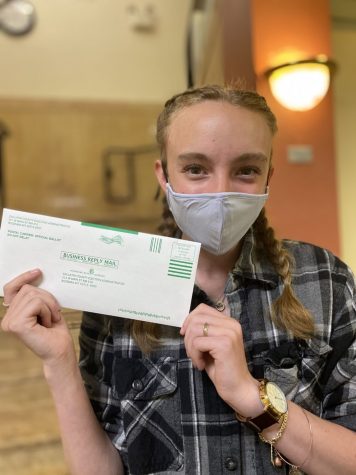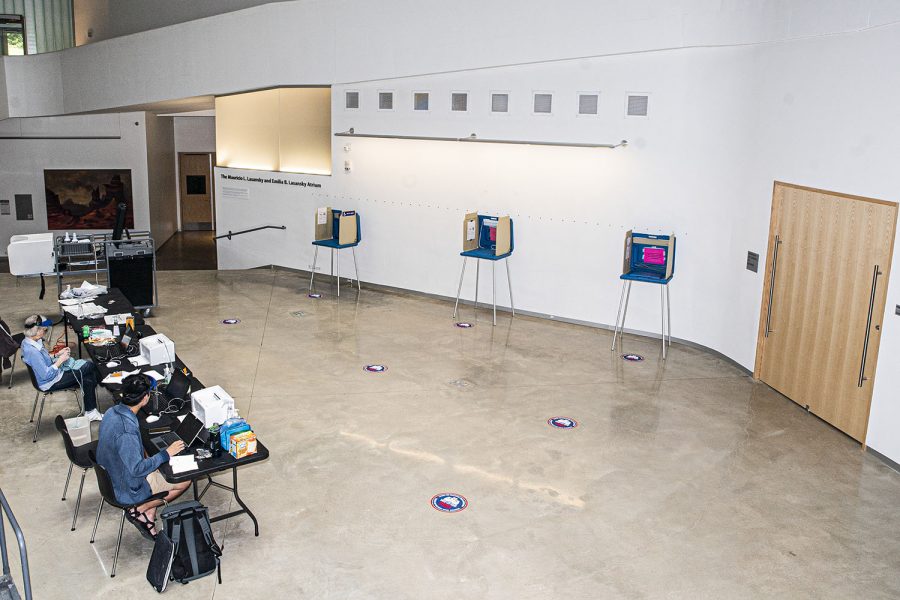First time voters share the importance of voting, encourage others to vote
With just under two weeks until the election, several new voters share their thoughts and concerns about voting for the first time.
A voting site is seen in the University of Iowa Visual Arts Building on Tuesday, June 2, 2020. Counties all across Iowa along with eight other states are participating in the 2020 primary elections.
Jorge Salinas, 37, voted in his first U.S. election since being granted citizenship earlier this year.
Salinas, an epidemiologist at University of Iowa Health Care, is from Lima, Peru, where voting is mandatory for all eligible citizens and a national holiday is dedicated to getting people out of school and work so that they are able to go vote. Salinas found the U.S. voting system much more complicated with results that he does not think reflect the thoughts of most Americans.
“I felt I needed to vote for the person who better represented what I believe,” Salinas, said. “There are very practical ramifications, as we are leaving one of the worst pandemics our world has seen in a century and the leaders we elect will have to handle it.”

Salinas’ first vote in a U.S. presidential election puts him in a group that usually is younger, as people reach the voting age of 18. With just under two weeks until Election Day, first-time voters The Daily Iowan spoke with say they look forward to finally exercising their constitutional right to vote; put whom they want in charge of the country, especially to deal with the coronavirus and economy; and simply have their voices heard.
Voters that fall into the 18-23 age range make up 1 in 10 eligible voters nationally. Young voters are among some of the people least likely to vote, and according to an analysis from The New York Times, fewer than half of Americans ages 18 to 29 voted in the 2016 presidential election.
As of 2019, voters ages 18 to 29 make up 37 percent of the electorate — roughly the same percentage that baby boomers, ages 60 and above, make up.
While voter turnout among young people is traditionally low, some first-time voters at the UI are speaking out on the importance of showing up to vote.
Kyle Kopf, a 20-year-old UI student, dropped off his first ballot on Oct. 9 with excitement to finally vote in his first presidential election.
Kopf is from West Des Moines and has worked with University Democrats on campus. The first-time voter said his experience was smooth and quick because he was able to skip the line since his ballot was already filled out by the time he got there. Kopf anticipated voting because this is a high stakes election, he said.
“I think it’s super important to vote because politicians try so hard to suppress the vote and the best check we have on politicians is through voting,” Kopf said. “If our vote didn’t matter so much, certain politicians wouldn’t try so hard to make voting difficult for Americans.”

In Johnson County, a county with a high number of young voters due to the university campus, as of Oct. 17, 16,655 active registered voters are in the 18-24 year age gap according to Johnson County election official John Deeth. This age range makes up 18 percent of total registered voters in the county. And there’s evidence concentrated efforts on college campuses help get young people out to vote, according to a report by Hawk the Vote — a nonpartisan student organization with a mission to get students voting and civically engaged — voter turnout increased by 16 percent on the UI campus between 2014 and 2018, Hawk the Vote’s inaugural year.
Kopf said voting is important because it keeps politicians accountable. He said he has concerns about politicians he thinks make voting difficult. Kopf said his concerns include any candidates not accepting the election results; for example, President Trump when Trump says there could be election fraud.
However, both in-person and mail-in voting are considered to be safe and reliable by election experts.
Ultimately voting for Biden, Kopf said he was on the fence between voting for Biden and voting third party because there are many of Biden’s policies that he disagrees with while he’s excited about other policies.
“I am passionate about getting Trump out of office. However, I am excited that Biden will stand up against the NRA, but he could be farther left,” Kopf said.
Shayna Jaskolka, 20 of Iowa City, also voted on Oct. 9, for her first election. Jaskolka is a UI student who is taking a break from school and voted by mail because she wanted to combat the loss of USPS funding and trusted that her ballot would make it to the auditor’s office quickly and safely.
Jaskolka said she identifies as liberal and is not a fan of the Trump Administration because she said that it is doing things that are very harmful to people such as Title IX rollbacks and working to repeal LGBTQ rights.
“So many people are being directly affected by decisions made by government officials. Within the past four years, things have been pushed under the rug and don’t get noticed, but we need someone who will work for the people and not corporations,” Jaskolka said.

The Iowa City native voted for Biden and worries about Biden losing the presidency and Democrats not winning a majority in the U.S. Senate. Jaskolka said that Biden was not her first choice, but knew he was going to be the nominee because people are very nostalgic about him and she appreciates that he is accommodating to many people’s interests.
“I recognize how important it is to vote for people who help us and keep harmful things from happening,” Jaskolka said.
Drew Muilenburg, a Linn-Mar High School senior, voted by absentee ballot in his first election. He saw long lines at the early voting locations and said absentee voting was easier because of COVID-19.
Muilenburg, 18, said that he is worried that civil unrest will pick up in Iowa no matter who wins the presidential election and hopes that both parties will accept the results when the time comes.
While he has always been right-leaning, prior to submitting his ballot, Muilenburg researched various Democratic candidates, but ultimately decided to vote to reelect Trump.
“Personally, it wasn’t that there were many things I liked about Trump, but I didn’t think Biden would be able to lead us out of the coronavirus or fix our economy,” Muilenburg said. “Before the coronavirus, Trump led us to high economic numbers and I’m confident Trump will lead us out of our current crisis.”
Muilenburg said it’s great to see kids his age involved in politics. He said voting is important because it’s a constitutional right. People who don’t vote are not getting their voices heard, he said.
In the 2016 election, Trump won Iowa by 9 points, but voters ages 18 to 24 favored Hillary Clinton, and voters ages 25 to 29 favored Trump.
This election is interesting, Salinas said, because each candidate represents very different world views and different perceptions of reality. He said they have different approaches to world problems, like the way that some leaders encourage a mask mandate during the pandemic and others don’t.
Salinas doesn’t care about one party or the other, but said he listens to science and follows trusted public health measures, resulting in the epidemiologist voting for Biden. Those factors helped drive his voting decisions down his ballot, he said.
As an epidemiologist, pandemic management is very important to him. Salinas said that voting is one of the most effective ways that average Americans can help manage the pandemic and that all Americans who believe that the coronavirus is a public health problem should go out and vote.
“It’s important to participate because our leaders decide things like how we handle the pandemic, and that’s life or death. Two-hundred thousand Americans have already died, and I think whoever leads at federal and local levels can affect how many people die,” Salinas said.
Sarah Smith, a 21-year-old voter from Iowa City, voted for Biden in her first election. She said that the only internal conflict she had was making the decision to vote by mail or vote in-person. COVID-19 had her questioning the safety of voting in person, but she did eventually decide to vote in person.
Even as a first-time voter herself, Smith helps other students learn how to vote and how to register to vote, so she feels as though she is more prepared than other students with the entire voting process.
“This booth makes me feel productive in the election because I wanted more political efficacy,” Smith said. “This is a good coping mechanism because I am helping people do their part in voting.”
Where to vote?
Iowa Memorial Union — 9 a.m. to 3 p.m. through Oct. 23.
At the County Auditor’s Office — Monday-Friday 7:45-5:30 913 S Dubuque St.
By Mail — Must be postmarked before or the day of Election Day
On Election Day — Find your voting precinct at The Iowa Secretary of State’s Website.



